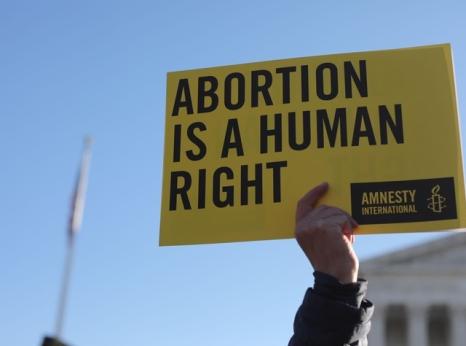Puerto Rico: Protect Access To Abortion

In 1973 the US Supreme Court ruled that abortion was legal in the landmark case Roe v. Wade. In Puerto Rico, there are currently limited legal restrictions on access to abortion, which can take place at any stage in the pregnancy when carried out by a doctor to conserve the life or the health, including mental health, of the pregnant person.
However, a recently published bill would restrict access to abortion after 22 weeks, or when a doctor determines that the foetus is viable, with the only exception being if the pregnant person’s life is in danger.
This new bill has been proposed in the context of an onslaught of legal challenges by anti-choice groups in the USA which seek to restrict access to abortion. In 2021 alone, more than 100 abortion restrictions were implemented across the USA, according to the Guttmacher Institute.
Puerto Rico’s Department of Health and Department of Justice have both expressed concerns with the new bill, which among other things, calls for the creation of a government registry of data of people who terminate pregnancies within the period in which the foetus is considered viable, the justification for it, as well as details of the medical professional who practices the abortion, which could undermine the right to privacy and confidentiality of people who choose to opt for an abortion or expose them or medical professionals to sanctions or stigmatization.
Public health and social science research have demonstrated that time-bound regulation of abortion – or setting “gestational limits” - may constitute an arbitrary and discriminatory barrier to accessing services, which has a disproportionate impact on the human rights of women and girls. The negative impact of gestational limits on access to quality public health care has been recognized by the WHO.
For gestational limits to be human rights compliant they must respect and protect the human rights of women and girls and all others who can become pregnant, including their rights to life, health and to bodily integrity and reproductive autonomy.
Gestational limits can deny people who need abortions access to services, disproportionately impacting those from poorer and/or marginalized backgrounds. Health professionals can also be arbitrarily precluded from considering all medical and clinical options with the best interest of their patient in view and there is a tendency to over apply the legal requirement of gestational limits due to the chilling effect they can have.
People who access abortions in the USA are disproportionally poor and low income. However, abortions in later pregnancy are quite rare. In the USA, for example, most abortions take place early in pregnancy. In the USA in 2016, only 1.3% of abortions occurred after 21 weeks. Similarly, in Puerto Rico, according to a submission by the Department of Health, the majority of abortions in Puerto Rico take place before 14 weeks.
Despite this, there are important reasons why some people will need abortions later in pregnancy, such as(1) when the pregnancy poses a risk to health of the pregnant person, (2) where there is a foetal impairment diagnosis, (3) where the pregnancy is the result of incest and/or sexual violence, (4) where the woman or girl was unaware of the pregnancy, or (5) had limited access sexual reproductive healthcare and/or abortion services, or(6) if the pregnant person was in a situation of domestic violence or had been trafficked and where their liberty or freedom of movement was restricted.
Puerto Rico’s Department of Health in a submission made on 17 March 2022 related to the bill, raised a series of other situations in which a woman might need to access an abortion later in pregnancy, including if her body is still under development and if she has never experienced a pregnancy before and has no understanding of how it feels, or if she is in pre-menopause and no longer expecting to be able to get pregnant.
International human rights law and standards require states to ensure access to safe and legal abortion to protect women’s and girls’ life and health at all stages of pregnancy without discrimination. The Human Rights Council in its General Comment 36 on the Right to Life has prohibited states from regulating abortion in a manner that runs contrary to their duty to ensure that women and girls do not have to undertake unsafe abortions.